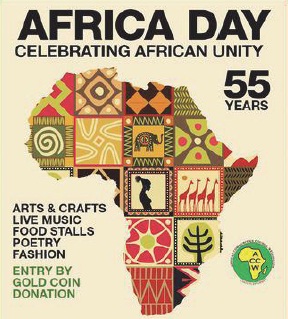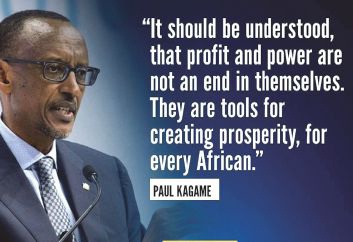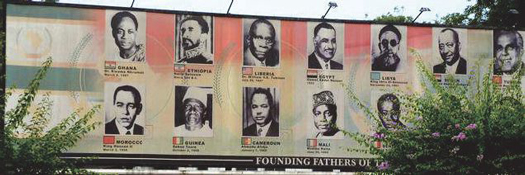Facts about Africa
The recent continent-wide celebration of Africa, called Africa Day, not only paid homage to the forming of the Organization of African Unity, now called the African Union, but also celebrated the diversity of Africa and its one billion inhabitants, making it the Earth’s second most populous continent.
Here are a few more facts about Africa: The continent’s total size is roughly one fifth of the Earth’s total landmass. Africa is larger than India, China, Mexico, the United States and a huge piece of Europe combined.
The continent of Africa has the largest desert in the world. The Sahara Desert is bigger than the continental USA.
It also has the world’s longest river (some say Brazil’s Amazon river is longer), the Nile, running some 4,258 miles, from the mountains of Burundi to its famed and fertile delta fan, where Egypt meets the Mediterranean Sea.
The continent has the largest mineral industries in the world. For many African countries, though most Africans receive little in the way of compensation, mineral exploration and production constitute a significant part of their economies. The continent is rich in oil and mineral reserves. It is home to five of the world’s top oilproducing countries, with an estimated 57 percent of Africa’s export earnings from hydrocarbons. In fact, it ranks first or second in reserves of bauxite, cobalt, industrial diamonds, phosphate rock, platinum-group metals, vermiculite, and zirconium. Its biggest mining resource is gold.
Of the over 2,000 recognized languages on the continent, Arabic is Africa’s most widely-spoken language. The religion of Islam is not only Africa’s fastest growing religion, it’s also the continent’s dominant religion.
History of Africa Day

On May 25, 2018 Africans and Africans in the Diaspora, from around the globe celebrated Africa Day. For many inside the celebrations, including concerts, elaborate ceremonies and speeches, the intent was lost from the origin of the annual “holiday.”
In a piece titled; “It’s time to get back to the original message behind Africa Day,” Lynsey Chutel and Yome Kazeem wrote in Quartz, that it can be traced back to April of 1958, “when the first Conference of Independent African States” convened. This was a meeting between the few independent African countries that were in existence and the fathers of Africa’s liberation movements.
Leaders from Ghana, Ethiopia, Sudan, Liberia, Egypt, Tunisia and Morocco were in attendance, with representatives of the National Liberation Front of Algeria and the Union of Cameroonian Peoples. At this summit they introduced a collective platform of the explicit assertion of Africa’s rejection of colonial and imperialist domination of the continent “becoming the first Pan-African Liberation conference to be held on the continent. … Further, at the meeting, the first African Freedom Day was celebrated, which was later recognized as Africa Day,” according to Africa.com.
This gathering sowed the seeds of what would become on May 25, 1963 the Organization of African Unity (later renamed in 2001 the African Union). It began with “32 free nations, led by Tanzania’s Julius Nyerere, Ghana’s Kwame Nkrumah, Sekou Toure of Guinea, and Kenneth Kaunda of Zambia.”
The Sirte Declaration of 1999 actually lead to the transformation of the OAU into the African Union. This Extraordinary Session of the OAU in Sirte, Libya was used by Libyan leader Muammar Gadhafito speed the process toward African unity.
It was African leaders, the OAU and their unanimous threat adopted at the 1998 Ouagadougou Summit to break the sanctions imposed on Libya by the UN Security Council, including permanent members the U.S. and the United Kingdom that cemented Gadhafi ‘s relationship with Black Africa.
It was actually South African President Nelson Mandela, Ugandan President Yoweri Museveni and Ghana President Jerry Rawlings who laid the OAU ultimatum at the feet of the UN, the U.S. and the U.K. to accept a trial of Libyan suspects, accused of the Lockerbie bombing, in the Netherlands instead of Scotland. Mandela, in violation of sanctions, flew to Libya twice in one week.
Chairman Paul Kagame: A Self-Sufficient African Union is Goal

Rwandan President and African Union chairperson Paul Kagame stated that nothing will stand in the way of Africa’s decision to implement reforms that are intended to make the African Union a self-reliant autonomous organization, depending little or not at all on foreign aid.
Kagame opened the recent Consultation Meeting on the AU Institutional Reform Process in Addis-Ababa, Ethiopia.
In 2016, the group was tasked by the AU General Assembly to head up reforms of the union, to find a formula to make the African Union “self-reliant.”
The following year, Kagame and a team of experts proposed to the General Assembly that every AU member state would be obligated to contribute a 0.2 percent levy on its imports to support African Union activities and operations.
“Today’s meeting represents a turning point in the process of implementing the Reform and Financing Decisions. As decided at the Summit in January, continuous communication and fine-tuning are necessary and beneficial,” Kagame said.
“Similarly,” he declared, “the fundamental task of defining the division of labor between the (AU) Commission and the (African) regional economic communities must be based on solid analysis and clear consensus.”
In addition, he said, “There are no obstacles that are going to be insurmountable because we have to keep going forward for the future of our continent.”

With support and engagement at every level, he believes the ultimate success of the reforms is assured, with the benefits to Africa as a result.












